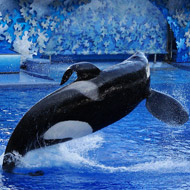SeaWorld orca Tilikum dying after contracting infection

Tilikum is a star attraction at SeaWorld Orlando.
Tilikum, the largest orca in captivity, is dying after contracting a serious bacterial infection, SeaWorld Orlando has announced.
Estimated to be around 35 years old, Tilikum, is a star attraction at the amusement park and features in the controversial documentary Blackfish.
“We are saddened to report that over the past few weeks, Tilikum’s behaviour has become increasingly lethargic, and the SeaWorld veterinary and animal care teams are concerned that his health is beginning to deteriorate,” the organisation posted on their website.
Tilikum was collected from another amusement park 23 years ago. SeaWorld say he is nearing the high end of the average life expectancy for male killer whales. Yet the species has been known to live as long as 100 years in the wild.
In 2010 Tilikum tragically killed his trainer, Dawn Brancheu, after dragging her under the water in his tank. It was the third time that he had been involved in the death of a trainer.
The incident grabbed the attention of filmmaker Gabriela Cowperthwaite, who made Tilikum the focus of the 2013 documentary ‘Blackfish’.
The documentary implies that the whales are driven to psychosis by the cruelties of their imprisonment, which leads them to attack humans.
SeaWorld strongly deny the allegations, saying in a statement that “the film conveys falsehoods, manipulates viewers emotionally and relies on questionable filmmaking techniques to create “facts” that support its point of view.”
SeaWorld vets are treating Tilikum with medication for what is believed to be a bacterial infection in his lungs.
Animal training supervisor Daniel Richardville added: “It has been our duty and passion to make sure we give him the utmost care we possibly can.”
Image (C) David R. Tribble



 The BSAVA has opened submissions for the BSAVA Clinical Research Abstracts 2026.
The BSAVA has opened submissions for the BSAVA Clinical Research Abstracts 2026.